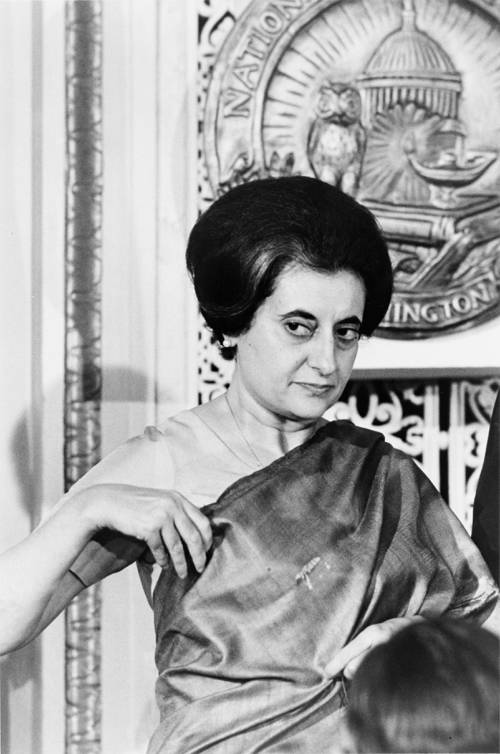
FAQ About Indira Gandhi

Who was Indira Gandhi?
Indira Gandhi was the first female Prime Minister of India, serving from 1966 to 1977 and then again from 1980 until her assassination in 1984. She was known for her strong leadership style and significant influence over Indian politics. As the daughter of Jawaharlal Nehru, India's first Prime Minister, she inherited a rich political legacy and played a critical role in shaping modern India.

When did Indira Gandhi serve as Prime Minister of India?
Indira Gandhi served as the Prime Minister of India initially from January 1966 to March 1977, and after a brief hiatus, she returned to power from January 1980 until her assassination in October 1984. Her years in office were marked by significant political and economic measures.

What are some key achievements of Indira Gandhi during her tenure?
Indira Gandhi is credited with several key achievements, including the nationalization of banks, the green revolution that improved India's food security, and the strategic victory in the 1971 Indo-Pakistani War, which led to the creation of Bangladesh. Her policies focused on economic development and social welfare.

How did Indira Gandhi influence Indian politics?
Indira Gandhi had a profound impact on Indian politics with her bold decision-making and authoritarian style. She significantly centralized power, strengthened the existing structure of the Congress Party, and frequently bypassed traditional economic policies to implement more aggressive reforms. Her leadership was characterized by strong, sometimes controversial, actions that reshaped Indian governance.

What was the Emergency imposed by Indira Gandhi?
The Emergency refers to a 21-month period from 1975 to 1977 when Indira Gandhi ruled India by decree, after proclaiming a state of emergency. This period was marked by censorship of the press, suspension of civil liberties, and mass detentions. It remains one of the most controversial periods in Indian political history.

Why was Indira Gandhi assassinated?
Indira Gandhi was assassinated on October 31, 1984, by her Sikh bodyguards in response to Operation Blue Star, a military operation ordered by her government to remove Sikh militants from the Golden Temple in Amritsar. This operation was deeply resented by many in the Sikh community, leading to heightened tensions and her eventual assassination.

What is Operation Blue Star, and how did it relate to Indira Gandhi's leadership?
Operation Blue Star was a military action ordered by Indira Gandhi in June 1984 to remove militant religious leader Jarnail Singh Bhindranwale and his followers from the Golden Temple complex in Amritsar. The operation resulted in significant casualties and heightened tensions between the Indian government and the Sikh community, contributing to her assassination later that year.

What was the impact of the Green Revolution under Indira Gandhi?
The Green Revolution, implemented during Indira Gandhi's tenure, significantly transformed India's agricultural landscape. It involved the introduction of high-yield crop varieties, improved irrigation, and fertilizers, leading to increased food production. This initiative helped India achieve self-sufficiency in food grains and is considered a pivotal moment in Indian agriculture.

How did Indira Gandhi contribute to women's leadership in India?
Indira Gandhi's tenure as Prime Minister marked a significant milestone for women's leadership globally, especially in India, as she became one of the very few women at the helm of a national government. Her leadership paved the way for future generations of women to aspire to and attain prominent political positions, challenging traditional gender roles.

What were the challenges faced by Indira Gandhi during her premiership?
During her premiership, Indira Gandhi faced numerous challenges including political opposition, the need for economic reform, internal insurgencies, and the pressures of maintaining national unity and integrity. The Emergency and Operation Blue Star were particularly controversial, sparking widespread debate and dissent.

How did Indira Gandhi's policies impact India's economy?
Indira Gandhi's policies had significant impacts on India's economy. She focused on centralized economic planning and implemented aggressive reforms such as nationalization of banks and increased government control over several industries. Though these policies aimed at equitable distribution and welfare, some critics argue that they led to economic inefficiency and stifled private enterprise.

How did people react to Indira Gandhi's leadership style?
Indira Gandhi's leadership style was polarizing; she was admired for her decisive and robust approach to governance but also criticized for authoritarian tendencies, particularly during the Emergency period. Her legacy is complex; she is both revered for her contributions and criticized for her disregard for democratic norms.

What was Indira Gandhi's role in the Indo-Pakistani War of 1971?
Indira Gandhi played a crucial role in the Indo-Pakistani War of 1971, which resulted in the liberation of Bangladesh. Her firm stance against Pakistani oppression in East Bengal helped expedite India's military intervention and ultimately led to a decisive victory, earning her global recognition for leadership and humanitarian intervention.

Why was the nationalization of banks significant during Indira Gandhi's administration?
The nationalization of banks in 1969 under Indira Gandhi's administration was aimed at extending banking access to rural and underserved areas, reducing economic disparities, and providing credit for agriculture and small industries. It marked a significant shift in India's economic strategy and remains a foundational policy in the country's banking sector.

What legacy did Indira Gandhi leave behind?
Indira Gandhi left behind a complex legacy characterized by her transformative policies and strong leadership. Her contributions to India's political and economic spheres are undeniable, yet her tenure also included controversial moments like the Emergency. Despite mixed opinions on her governance, she remains an iconic figure in Indian history.

In what ways did Indira Gandhi influence global politics?
Indira Gandhi's influence on global politics was marked by her firm and independent foreign policy stance, including leading the Non-Aligned Movement and supporting liberation movements worldwide. She navigated Cold War geopolitics with a focus on strengthening India's position on the global stage, advocating for peace, development, and south-south cooperation.

Did Indira Gandhi face any criticism during her tenure as Prime Minister?
Yes, Indira Gandhi faced significant criticism during her tenure, particularly for her role in imposing the Emergency, wherein civil liberties were curtailed and political opponents were jailed. Her approach to governance was often described as autocratic, leading to debates about her commitment to democratic principles.

How did Indira Gandhi's assassination affect India?
Indira Gandhi's assassination had profound effects on India. It led to widespread anti-Sikh riots across the country, resulting in significant loss of life and property. Politically, her assassination marked the end of an era and triggered a re-evaluation of her policies and legacy. It also highlighted the deep-rooted ethnic tensions within Indian society.
